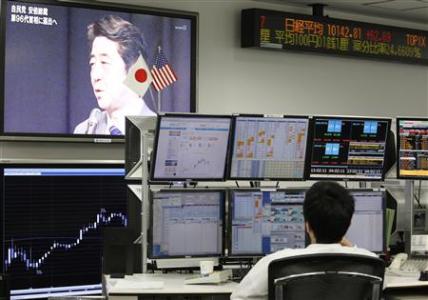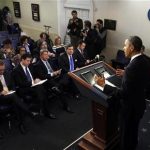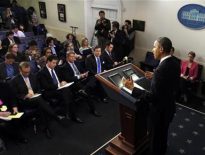(Reuters) – The yen fell to a 20-month low against the dollar on Wednesday, buoying the benchmark Nikkei stock average to nine-month highs, as Japan swore in a new prime minister eager to pursue drastic stimulus steps to drive the country’s economy out of deflation.

Asian shares and other assets were capped in thin holiday trade, with investors focusing on the fate of U.S. negotiations to avert a budget crunch looming at the end of the year.
Markets in Singapore .FTSTI, Malaysia .KLSE, Indonesia .JKSE, the Philippines .PSI and South Korea .KS11 reopened on Wednesday after closing on Tuesday for the Christmas holiday.
Hong Kong and Australia remain closed on Wednesday. Europe also will not trade, but U.S. markets reopen later in the day.
MSCI’s broadest index of Asia-Pacific shares outside Japan .MIAPJ0000PUS was little changed. Shanghai shares .SSEC were flat, but stayed in positive territory on the year after a 2.5 percent jump on Tuesday erased 2012 losses. It is set for a first annual gain in three years. South Korean shares .KS11 ended nearly flat.
Shinzo Abe, whose party won a landslide victory in an election earlier this month, was elected Japan’s premier on Wednesday. Abe, who is expected to appoint his cabinet later Wednesday, is calling for a mix of aggressive monetary policy easing and big fiscal spending to beat deflation and rein in the strong yen.
He has kept up pressure on the Bank of Japan to be more drastic and adopt a 2 percent inflation target to beat deep-rooted deflation, pushing the yen to a 20-month low of 85.38 yen on trading platform EBS on Wednesday. Traders eyed the dollar’s 2011 high of 85.53 yen as the next target.
The euro rose as high as 112.55 yen on EBS, just below its 16-month high of 112.59 yen hit on December 19.
The weaker yen has bolstered hopes for better earnings from Japanese companies and underpinned the Nikkei, which has gained some 18 percent since mid-November when the election was scheduled, fuelling expectations for Abe’s party to win. The yen has lost nearly 8 percent against the dollar in the same period.
The Nikkei .N225 closed at a nine-month high with a 1.5 percent gain. .T
“Most foreign funds have added Japanese shares and there are fewer participants today, but there still is a reason for the Nikkei to rise,” said Hideyuki Okoshi, general manager at Chibagin Securities. “Not only exporters but investors are buying other stocks which could benefit under the new government.”
Japanese government debt prices fell, with the 10-year bond futures hitting a three-month low of 143.65 in active trade. Ten-year JGB yields rose 1.5 basis points to 0.780 percent, matching a six-week high hit on December 19.
“We continue to see equities going high, so the pressure is on the long end of the JGB curve. For the short end of the curve, we continue to see the BOJ ease aggressively, so there is no change in that,” said Tadashi Matsukawa, head of Japan fixed income at PineBridge Investments.
Minutes of the BOJ’s policy-setting meeting in November, released on Wednesday, showed that some board members said the central bank must act decisively, without ruling out any policy options, if the outlook for the economy and prices worsens further.
“FISCAL CLIFF” RISK
The dollar was expected to stay firm this week as the U.S. fiscal impasse is likely to continue to sap investor appetite for risky assets and raise the dollar’s safe-haven appeal.
Ten-year U.S. Treasury notes held steady in price to yield roughly 1.776 percent in Asia, little changed from late U.S. trade on Monday. The U.S. bond market was closed on Tuesday for Christmas. <US/T>
“I think there is about a 50 percent chance of the cliff being avoided at the year-end through an agreement of some kind, even if it turns out to be just a short-term postponement,” said Tomoaki Shishido, a rate analyst for Nomura Securities in Tokyo.
A U.S. official said on Tuesday that President Barack Obama may return to Washington from his Hawaiian holiday as early as Wednesday evening to address the unfinished negotiations over the “fiscal cliff” of some $600 billion in automatic spending cuts and tax increases set to start on January 1.
If the United States falls off the fiscal cliff, economists warn that the world’s largest economy could plunge into recession and drag global economies down as well.
Data out of Asia on Wednesday underscored fragile global growth.
Exports in Thailand, Southeast Asia’s second-largest economy, rose nearly 27 percent in November from a year ago, but that reflected recovery from flooding in late 2011 and not growth in global demand.
South Korea’s key consumer sentiment index held steady in December from November and stood below the neutral point for a fifth consecutive month, diminishing hopes of a quick economic rebound.
Gold edged lower on Wednesday on uncertainty over the fiscal cliff, but a weaker yen sparked a rally in bullion futures on the Tokyo Commodity Exchange (TOCOM).
Brent crude climbed above $109 per barrel on Wednesday in thin trade, with investors hoping for a last-minute deal to avoid a U.S. fiscal crisis. U.S. crude futures also inched up 0.4 percent to $88.94. <O/R>
(Additional reporting by Ayai Tomisawa and Dominic Lau in Tokyo and Masayuki Kitano in Singapore; Editing by Richard Borsuk)





